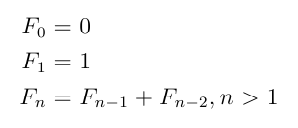
CS 3343/3341 Introduction to Algorithms |
Fibonacci Numbers: Cascade of Recursive Calls |

// Fibonacci: compute Fibonacci numbers
public class Fibonacci {
public static long calls = 0;
public static long f(long n) {
calls++;
if (n <= 1) return n;
return f(n-1) + f(n-2);
}
public static void elapsedTime(long startTime) {
long stopTime = System.currentTimeMillis();
double elapsedTime = ((double)(stopTime - startTime))/1000.0;
System.out.println(elapsedTime + " sec." +
" " + calls);
}
public static void main(String[] args) {
long startTime = System.currentTimeMillis();
for (int i = 0; i < 10; i++) {
calls = 0;
System.out.println(i + " " + f(i) +
" " + calls);
}
System.out.println();
for (int i = 5; i <= 50; i += 5) {
calls = 0;
System.out.print(i + " " + f(i) + "\t");
elapsedTime(startTime);
}
}
}
|
n F(n) calls ------------- 0 0 1 1 1 1 2 1 3 3 2 5 4 3 9 5 5 15 6 8 25 7 13 41 8 21 67 9 34 109 | n F(n) Elapsed time Calls ------------------------------------------------ 5 5 0.002 sec. 15 10 55 0.005 sec. 177 15 610 0.007 sec. 1973 20 6765 0.007 sec. 21891 25 75025 0.012 sec. 242785 30 832040 0.061 sec. 2692537 35 9227465 0.516 sec. 29860703 40 102334155 5.006 sec. 331160281 45 1134903170 51.297 sec. 3672623805 50 12586269025 573.708 sec. 40730022147 55 139583862445 6436.252 sec. 451702867433 60 1548008755920 69839.095 sec. 5009461563921 |
// Fibonacci0: compute Fibonacci numbers without recursion
public class Fibonacci0 {
public static long f(long n) {
long f0 = 0, f1 = 1, f2 = -1;
for (long i = 1; i < n; i++) {
f2 = f0 + f1;
f0 = f1;
f1 = f2;
}
return f2;
}
public static void elapsedTime(long startTime) {
long stopTime = System.currentTimeMillis();
double elapsedTime = ((double)(stopTime - startTime))/1000.0;
System.out.println(elapsedTime + " sec.");
}
public static void main(String[] args) {
long startTime = System.currentTimeMillis();
for (int i = 2; i < 20; i++)
System.out.println("n: " + i + "\tF(n): " + f(i));
System.out.println();
for (long i = 5; i < 95; i += 5) {
System.out.print("n: " + i + "\tF(n): " + f(i) + "\t");
elapsedTime(startTime);
}
}
}
|
n F(n) -------- 2 1 3 2 4 3 5 5 6 8 7 13 8 21 9 34 10 55 11 89 12 144 13 233 14 377 15 610 16 987 17 1597 18 2584 19 4181 | n F(n) Elapsed time ------------------------------------ 5 5 0.020 sec. 10 55 0.032 sec. 15 610 0.033 sec. 20 6765 0.033 sec. 25 75025 0.035 sec. 30 832040 0.035 sec. 35 9227465 0.035 sec. 40 102334155 0.036 sec. 45 1134903170 0.037 sec. 50 12586269025 0.038 sec. 55 139583862445 0.038 sec. 60 1548008755920 0.038 sec. 65 17167680177565 0.040 sec. 70 190392490709135 0.040 sec. 75 2111485077978050 0.040 sec. 80 23416728348467685 0.041 sec. 85 259695496911122585 0.041 sec. 90 2880067194370816120 0.041 sec. |